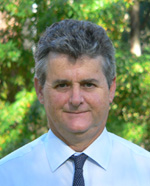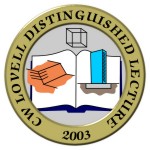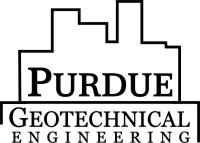
11th C W Lovell Distinguished Lecture - October 17, 2012

Scott Sloan
Laureate Professor
ARC Centre of Excellence in Geotechnical Science and Engineering
University of Newcastle, NSW, Australia
Geotechnical Stability Analysis
Historically, geotechnical stability analysis has been performed by a variety of approximate methods that are based on the notion of limit equilibrium. Although they appeal to engineering intuition, these techniques have a number of major disadvantages, not the least of which is the need to presuppose an appropriate failure mechanism in advance. This feature can lead to inaccurate predictions of the true failure load, especially for cases involving layered materials, complex loading, or three-dimensional deformation.
This lecture will describe recent advances in stability analysis which avoid these shortcomings. Attention will be focused on new methods which combine the limit theorems of classical plasticity with finite elements to give rigorous upper and lower bounds on the failure load. These methods, known as finite element limit analysis, do not require assumptions to be made about the mode of failure, and use only simple strength parameters that are familiar to geotechnical engineers. The bounding properties of the solutions are invaluable in practice, and enable accurate solutions to be obtained through the use of an exact error estimate and automatic adaptive meshing procedures. The methods are extremely general and can deal with layered soil profiles, anisotropic strength characteristics, fissured soils, discontinuities, complicated boundary conditions, and complex loading in both two and three dimensions. Following a brief outline of the new techniques, stability solutions for a number of practical problems will be given including foundations, anchors, slopes, excavations, and tunnels.
About Scott Sloan
Laureate Professor Scott Sloan is an ARC Laureate Fellow, a former ARC Federation Fellow, and the founding director of the ARC Centre of Excellence for Geotechnical Science and Engineering. He is also an elected Fellow of the Australian Academy of Science (where he is one of just four civil engineers) and the Academy of Technological Sciences and Engineering. In 2005 he received the Monash University Alumnus of the Year Award in Civil Engineering and was invited by the ICE London to present the 51st Rankine Lecturer in 2011 (the highest accolade available to a geotechnical engineer). His research contributions have been recognized by various awards including the 2000 Telford Medal and the 2007 Telford Premium from the ICE London (for the best paper published in any of the Institution’s journals and the best paper on applied mechanics, respectively), an invitation to give the 2003 E H Davis Lecture from the Australian Geomechanics Society (for outstanding contributions to theoretical geomechanics), a Centenary Medal in 2003 from the Prime Minister of Australia (for service to Australian Society in Civil and Geotechnical Engineering), a 2004 Federation Fellowship from the Australian Research Council (one of 25 awarded nationally), the 2005 Desai Medal and 2008 Booker Medal from the International Association for Computer Methods and Advances in Geomechanics (for outstanding contributions to computational geomechanics), the 2005 Thomas A Middlebrooks Award from the American Society of Civil Engineers (for a paper of special merit in the field of geotechnical engineering), and a 2010 Fellows Award from the International Association of Computational Mechanics. Professor Sloan is a co-editor of the international journal Computers and Geotechnics (where he handles over 400 papers per year) and a member of the editorial board for Computational Mechanics, Computers and Structures, the International Journal for Numerical and Analytical Methods in Geomechanics, Optimization and Engineering and Engineering Computations. He has held visiting professorships at MIT and UPC (Barcelona), and is a board member for the International Association for Computational Methods and Advances in Geomechanics (IACMAG). He chaired the Engineering, Mathematics and Informatics College of Experts for the Australian Research Council in 2010. Professor Sloan’s research interests include computational stability analysis, nonlinear finite element algorithms, geotechnical analysis, modelling unsaturated soil behavior, nonlinear optimization methods, and georemediation.
Lecture (4:30 pm - LWSN 1142)
Reception and dinner (6:30 pm - West Faculty Lounge, PMU) (Reservations Required by 3:00 pm October 10)


